GDG DevFest Nizhny Novgorod 2016: how it was
On December 10, the 2nd Nizhny Novgorod GDG DevFest took place in the Nizhny Novgorod Ankudinovka Technopark . Our dream team saved 300+ developers from the winter cold and information hunger.

We are not going to calm down and relax - we are considering new meetings on Android, Firebase, Internet of Things, Virtual and Augmented Reality, Machine Learning, etc. Well, of course, we are already thinking about GDG DevFest 2017. The coming year will be rich in events from GDG NN! In the meantime, read about how DevFest NN 2016 passed below (warning: many photos).
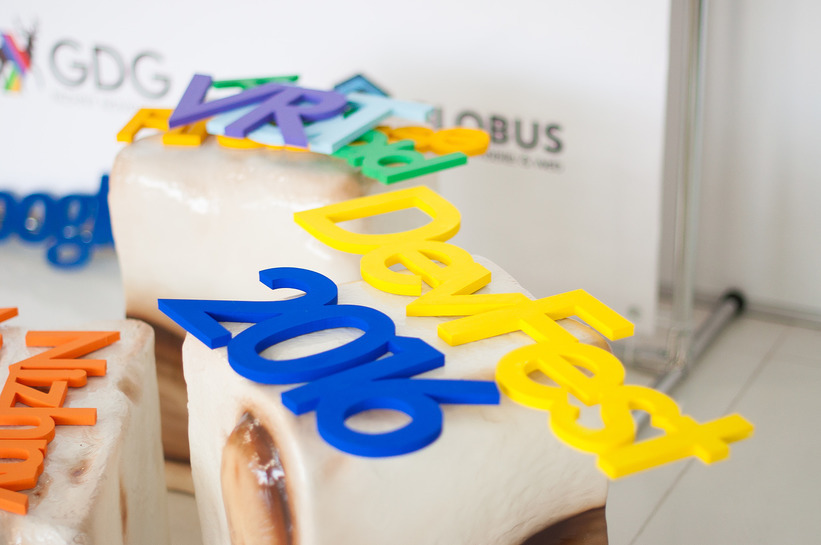
')
During the second DevFest, speakers spoke on the themes of Modular Android UI, MvvmCross, Firebase for Mobile Developers and argued about how useful Rust and Go are in the context of modern programming.
Participants learned how to design for Google Cardboard, automate SDK testing, and experience the power of VR / AR. And this is far from all that this Fest is remembered with.

Everyone had the opportunity to talk to the speakers one-on-one right after the performance. In the case of Serbian speaker Milos Marinkovic, such communication also helped to pump up English!

We managed to fit in one day 16 hardcore reports for experienced and novice developers. Despite the fact that the participants had to choose where to go - each speaker had many listeners. Now more about the topics of the conference.
Modular Android UI & MvvmCross: more cross-platform code in your application
The first reports were prepared by Milosh Marinkovich from CounterPath (Novi Sad) and Vyacheslav Kormushkin from HARMAN CS (N.Novgorod).
Milos told how to solve the problem of creating complex user interfaces on Android in modular applications - so that your UI does not “break”.
Vyacheslav devoted the report of the Xamarin technology and showed in practice how, having put a minimum of efforts, to port on Android a ready-made application written for a different platform. In particular, the discussion focused on the key parts of MvvmCross: View Model, Data Binding, Dependency Injection, etc.

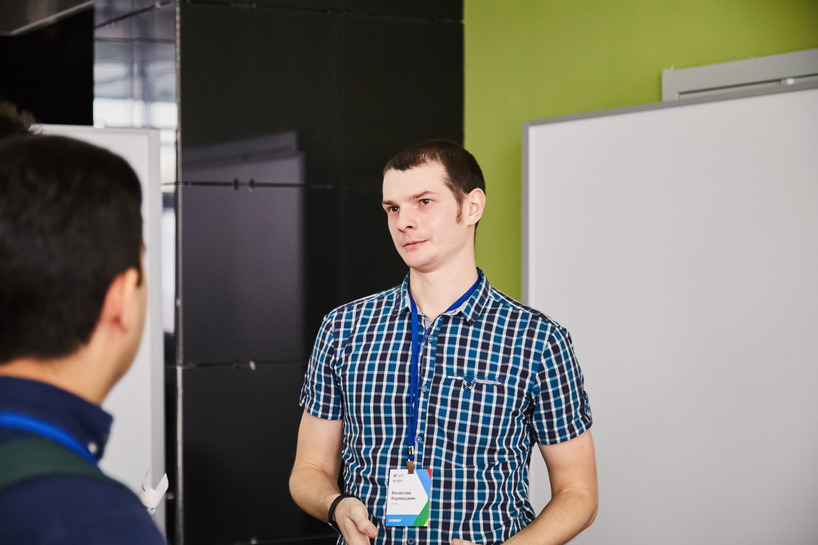
Pavel Malyshev from Mustlab (N.Novgorod) spoke about errors when creating isomorphic web applications, raised architectural issues, working techniques and techniques, and also shared real-life cases.
The report by Alexander Denisov (GDG Leader, N.Novgorod) was about Firebase services that can be used in developing Android applications (and not only). In addition, he spoke about the innovations announced at the Firebase Summit, held recently in Berlin.
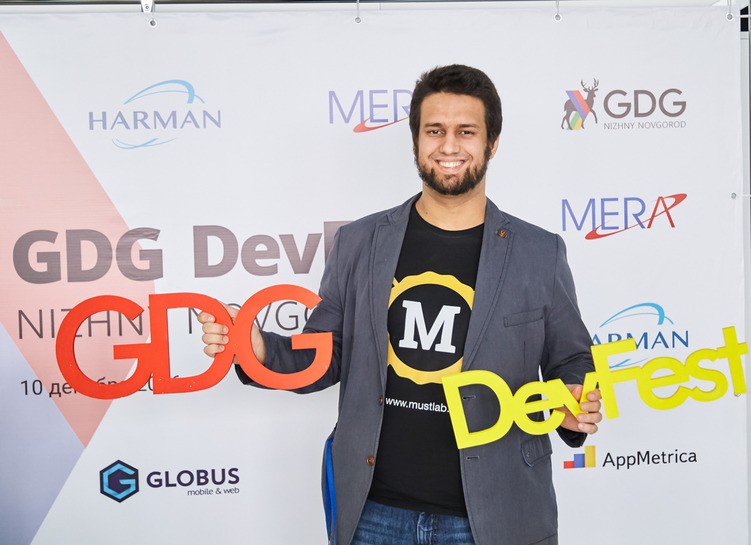

Leonid Kalneus (GDG-leader, Novosibirsk) and Nikita Baksalyar from MaidSafe (Kurgan) decided to focus on relatively new (read "less common in Russia") programming languages - Go and Rust.
Leonid told who (except Google) why and how Go is used in the work, and Nikita revealed the secret of how to use Rust when creating high-performance server applications and why the Servo browser engine written in Rust is the future of the entire Web.


Especially warm feedback received a report by Timur Akhmetgareyev (App in the Air Inc, Moscow) about the ecosystem of the restarted Firebase - how it handles the tasks of mobile products in the developmental stage and about the difficulties that you encounter when using. By the way, about the experience of App in the Air Inc. c Firebase told on Google I / O (the guys participated in the beta testing).
The youngest speaker Dmitry Bartalevich (EPAM Systems, Minsk) talked about how the web boldly escapes from the online environment using the Web Bluetooth API and PWA tools. Dima is generally interested in the fact that he will not get to production soon, but DevFest is also about how to be one step ahead of the rest of the developers.


Mikhail Vaisman (CEO Trinity Digital, Moscow) dedicated a report to libraries for displaying VR 360 panoramas. What is valuable, he touched upon many technical aspects and shared his own examples on Android, conducted a comparative analysis of the WebGL, OpenGL and Google VR libraries.
Perhaps the most unusual topic touched upon Anastasia Artemyeva (MERA, N.Novgorod). She shared the details of the project, which was ordered by North American biologists who monitor the livelihoods of corals. The main objective of the project was to “enhance the intelligence” of the already existing equipment, teaching it to communicate using the Wi-Fi protocol (Wi-Fi under water, KARL!) With the application on the Android tablet. The requirements for the underwater application were also non-standard. The attention of the audience was drawn to one hundred percent!


Zviad Kardava (GDE IoT, Moscow) brought with him the first consumer versions of Project Tango and Google Home (we built houses and cats in 5 seconds). He spoke about their capabilities and then answered many questions from the developers, since These devices are not yet available in the Russian Federation.
Igor Sheko (VoxImplant, Moscow) touched on many topics at once in his report: he told why it is important and necessary to use PWA and AMP, showed the IoT intercom phone project with WebRTC and without backend, shared how VORImplant handles WebRTC and did not even go around the topic Firebase And most importantly, Igor suggested how to stop writing CRUD and start living.
The report was not without a share of humor and self-irony - a pleasant addition to practical value.


Alexey Vitenko (Yandex, Minsk) and Zhenya Ryzhkin (Yandex, St. Petersburg) highlighted the details of a single platform for analytics of mobile applications, mobile tracking and crash reporting - AppMetrica. The report focused on testing the mobile SDK. The guys shared their experience in automating the testing of the SDK of such a specific format and told why it was suddenly so difficult and how we overcame it all with honor.
Alexander Korshak (GDG-leader, N.Novgorod) touched upon the topic of spherical video: he spoke about aspects of working with 360 video and its features: how to shoot, play, how the video format is organized and how to work with it.

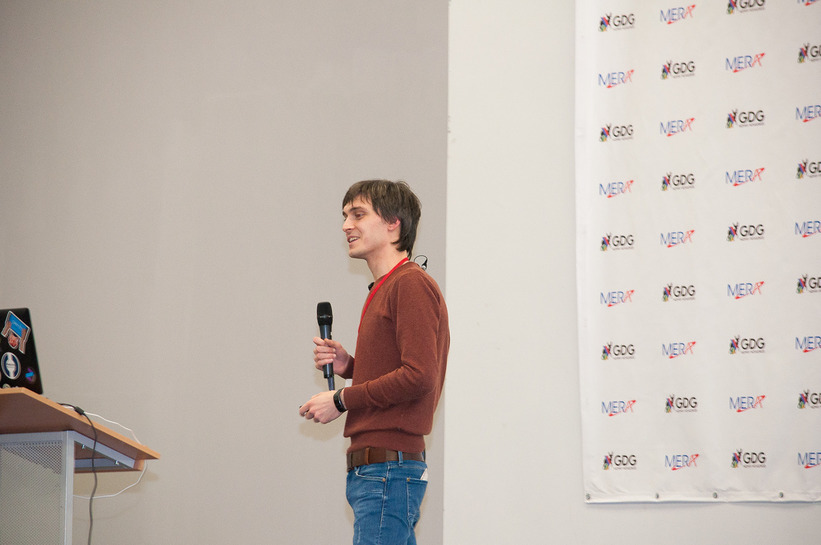
Our DevFest completed reports on topics of data synchronization and so popular machine learning.
Dmitry Ustimov (GDG Leader, N.Novgorod) reviewed the standard SyncAdapter mechanism and gave an answer to the requirements and limitations it imposes. Dima also told how to get around these restrictions by writing his SyncAdapter when the customer’s requirements differ from the standard behavior - in 99 cases out of 100.
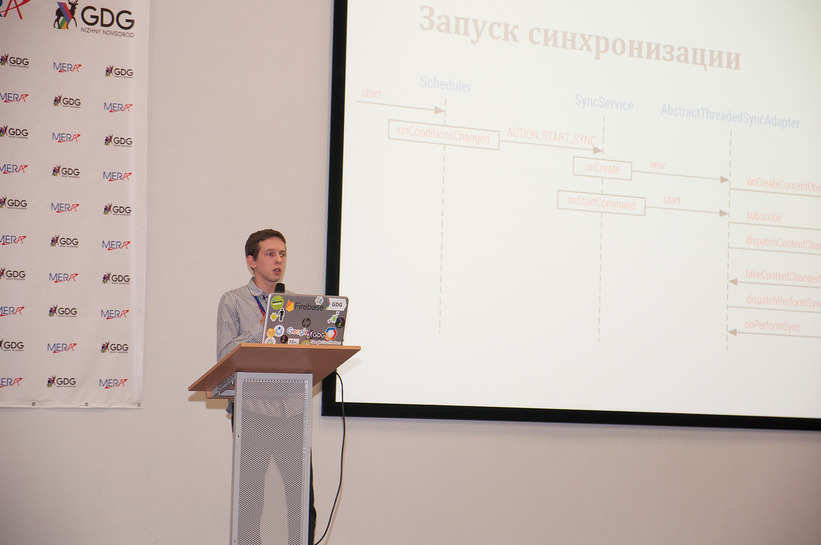

That's all! We are pleased that we managed to gather high-class experts from all over Russia and even from other countries. Our platform for communication fans of Google-technology will re-open in the Lower 2017 in the fall of 2017. With every DevFest we are getting better!
By the way, now there are three leaders in GDG NN: Dmitry Ustimov and Alexander Korshak joined Sasha Denisov. And they prepared DevFestNN2016 in total more than 20 caring people.
Join GDG Nizhny Novgorod on Facebook . See you!
# gdgnn2016 # devfest2016 #gdgnizhny #devfest
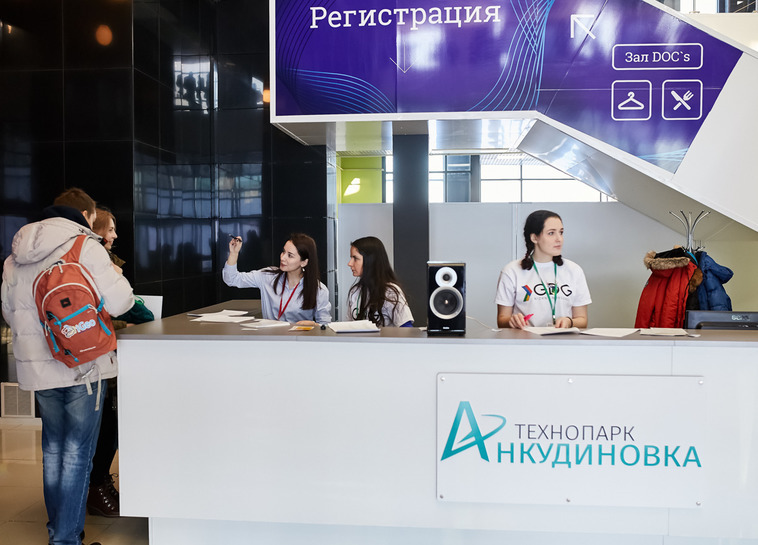

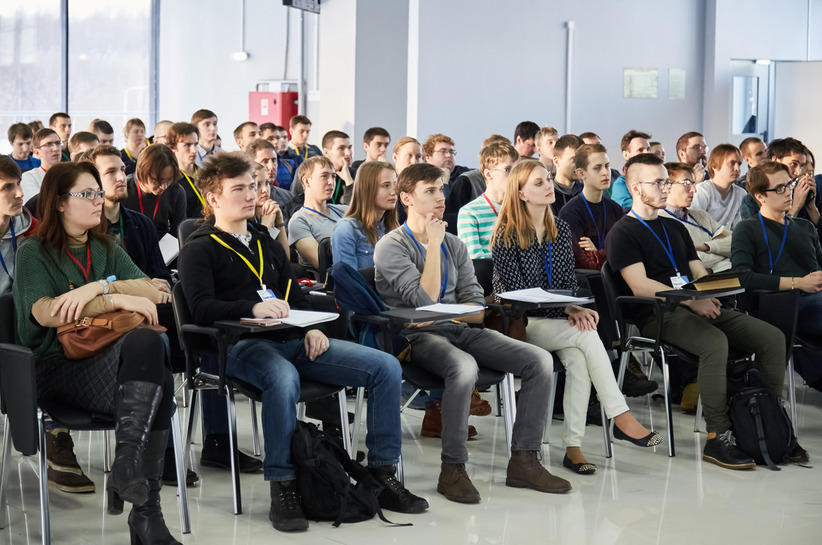

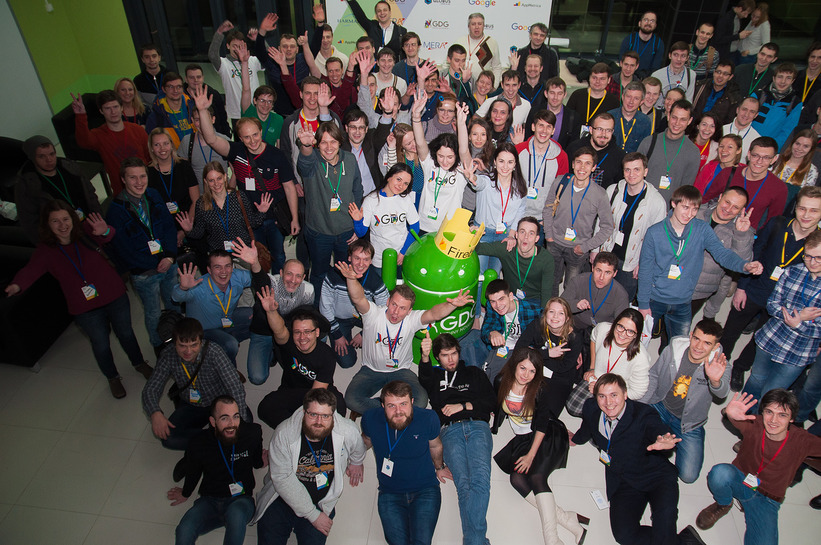

We are not going to calm down and relax - we are considering new meetings on Android, Firebase, Internet of Things, Virtual and Augmented Reality, Machine Learning, etc. Well, of course, we are already thinking about GDG DevFest 2017. The coming year will be rich in events from GDG NN! In the meantime, read about how DevFest NN 2016 passed below (warning: many photos).

')
During the second DevFest, speakers spoke on the themes of Modular Android UI, MvvmCross, Firebase for Mobile Developers and argued about how useful Rust and Go are in the context of modern programming.
Participants learned how to design for Google Cardboard, automate SDK testing, and experience the power of VR / AR. And this is far from all that this Fest is remembered with.

Everyone had the opportunity to talk to the speakers one-on-one right after the performance. In the case of Serbian speaker Milos Marinkovic, such communication also helped to pump up English!

We managed to fit in one day 16 hardcore reports for experienced and novice developers. Despite the fact that the participants had to choose where to go - each speaker had many listeners. Now more about the topics of the conference.
Modular Android UI & MvvmCross: more cross-platform code in your application
The first reports were prepared by Milosh Marinkovich from CounterPath (Novi Sad) and Vyacheslav Kormushkin from HARMAN CS (N.Novgorod).
Milos told how to solve the problem of creating complex user interfaces on Android in modular applications - so that your UI does not “break”.
Vyacheslav devoted the report of the Xamarin technology and showed in practice how, having put a minimum of efforts, to port on Android a ready-made application written for a different platform. In particular, the discussion focused on the key parts of MvvmCross: View Model, Data Binding, Dependency Injection, etc.


Preparing isomorphic applications correctly & Firebase for Mobile Developers: add a little fire
Pavel Malyshev from Mustlab (N.Novgorod) spoke about errors when creating isomorphic web applications, raised architectural issues, working techniques and techniques, and also shared real-life cases.
The report by Alexander Denisov (GDG Leader, N.Novgorod) was about Firebase services that can be used in developing Android applications (and not only). In addition, he spoke about the innovations announced at the Firebase Summit, held recently in Berlin.


The Go Programming Language - Why Should You Try? & Rust language in the context of modern programming
Leonid Kalneus (GDG-leader, Novosibirsk) and Nikita Baksalyar from MaidSafe (Kurgan) decided to focus on relatively new (read "less common in Russia") programming languages - Go and Rust.
Leonid told who (except Google) why and how Go is used in the work, and Nikita revealed the secret of how to use Rust when creating high-performance server applications and why the Servo browser engine written in Rust is the future of the entire Web.


Who needs Firebase & Web and why outside the web!
Especially warm feedback received a report by Timur Akhmetgareyev (App in the Air Inc, Moscow) about the ecosystem of the restarted Firebase - how it handles the tasks of mobile products in the developmental stage and about the difficulties that you encounter when using. By the way, about the experience of App in the Air Inc. c Firebase told on Google I / O (the guys participated in the beta testing).
The youngest speaker Dmitry Bartalevich (EPAM Systems, Minsk) talked about how the web boldly escapes from the online environment using the Web Bluetooth API and PWA tools. Dima is generally interested in the fact that he will not get to production soon, but DevFest is also about how to be one step ahead of the rest of the developers.


Design for Google Cardboard & Internet of Underwater Things
Mikhail Vaisman (CEO Trinity Digital, Moscow) dedicated a report to libraries for displaying VR 360 panoramas. What is valuable, he touched upon many technical aspects and shared his own examples on Android, conducted a comparative analysis of the WebGL, OpenGL and Google VR libraries.
Perhaps the most unusual topic touched upon Anastasia Artemyeva (MERA, N.Novgorod). She shared the details of the project, which was ordered by North American biologists who monitor the livelihoods of corals. The main objective of the project was to “enhance the intelligence” of the already existing equipment, teaching it to communicate using the Wi-Fi protocol (Wi-Fi under water, KARL!) With the application on the Android tablet. The requirements for the underwater application were also non-standard. The attention of the audience was drawn to one hundred percent!


When an assistant and augmented reality meet on the same floor & frontend in the garage
Zviad Kardava (GDE IoT, Moscow) brought with him the first consumer versions of Project Tango and Google Home (we built houses and cats in 5 seconds). He spoke about their capabilities and then answered many questions from the developers, since These devices are not yet available in the Russian Federation.
Igor Sheko (VoxImplant, Moscow) touched on many topics at once in his report: he told why it is important and necessary to use PWA and AMP, showed the IoT intercom phone project with WebRTC and without backend, shared how VORImplant handles WebRTC and did not even go around the topic Firebase And most importantly, Igor suggested how to stop writing CRUD and start living.
The report was not without a share of humor and self-irony - a pleasant addition to practical value.


Automation of SDK testing for Android using the example of AppMetrica & Spherical video. Inside view
Alexey Vitenko (Yandex, Minsk) and Zhenya Ryzhkin (Yandex, St. Petersburg) highlighted the details of a single platform for analytics of mobile applications, mobile tracking and crash reporting - AppMetrica. The report focused on testing the mobile SDK. The guys shared their experience in automating the testing of the SDK of such a specific format and told why it was suddenly so difficult and how we overcame it all with honor.
Alexander Korshak (GDG-leader, N.Novgorod) touched upon the topic of spherical video: he spoke about aspects of working with 360 video and its features: how to shoot, play, how the video format is organized and how to work with it.


Data synchronization, with and without crutches
Our DevFest completed reports on topics of data synchronization and so popular machine learning.
Dmitry Ustimov (GDG Leader, N.Novgorod) reviewed the standard SyncAdapter mechanism and gave an answer to the requirements and limitations it imposes. Dima also told how to get around these restrictions by writing his SyncAdapter when the customer’s requirements differ from the standard behavior - in 99 cases out of 100.


That's all! We are pleased that we managed to gather high-class experts from all over Russia and even from other countries. Our platform for communication fans of Google-technology will re-open in the Lower 2017 in the fall of 2017. With every DevFest we are getting better!
By the way, now there are three leaders in GDG NN: Dmitry Ustimov and Alexander Korshak joined Sasha Denisov. And they prepared DevFestNN2016 in total more than 20 caring people.
Join GDG Nizhny Novgorod on Facebook . See you!
# gdgnn2016 # devfest2016 #gdgnizhny #devfest





Source: https://habr.com/ru/post/319598/
All Articles